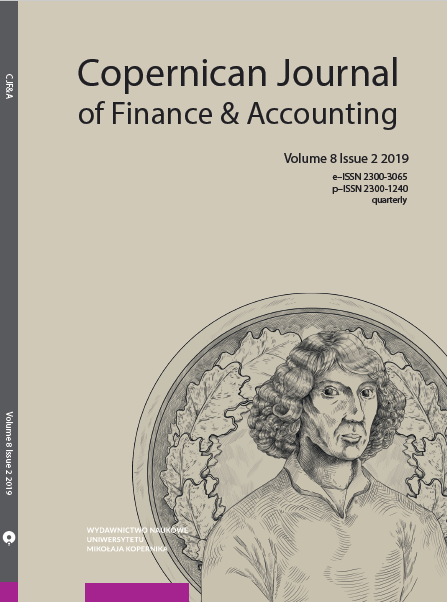THE IMPACT OF INTANGIBLE FACTORS ON PROFITABILITY: EVIDENCE FROM CORPORATIONS TRADED AT MUSCAT SECURITIES MARKET IN OMAN
DOI:
https://doi.org/10.12775/CJFA.2019.007Schlagworte
Intangibles, Financial Performance, Financial Reporting, International Accounting Standards (IASs), International Financial Reporting Standards (IFRSs), OmanAbstract
The objective of this paper is to determine whether corporate financial performance may be influenced from intangible assets owned by a company and some special incurring expenditures benefiting the intangible value of the company even though such items could also be technically expensed contrary to getting capitalized. Combining the intangibles reported on the corporate balance sheets with the expenditures such as R&D, staff and advertising expenses, a variable called Calculated Value of Intangible Factors (CVIF) is specifically generated and is examined as to whether intangibles alone might potentially have a significant effect on corporate profitability ratios, and if so to what extent. The sample consists of non-financial public companies traded at Muscat Securities Market in Oman and the sampling period covers the time window from 2013 until 2017. Two regressors are used to capture the effect of intangible factors; meaning CVIF and CVIF/Total Assets (CVIFTA) respectively, the latter of which is a relative measure. Four (4) profitability measures, namely Gross Profit Margin (GPM), EBIT Margin (EBITM), Net Profit Margin (NPM) and Return on Assets (ROA) are developed as proxies to indicate for corporate financial performance. Considering all the resulting eight (8) models each, panel data regression analyses are performed separately to specifically document the linkage between corporate intangibles and corporate financial performance. Results provide a strong evidence by showing that intangibles do have a significant and a positive effect on corporate financial performance, except when ROA is regressed by CVIFTA rather than CVIF. This effect on and the linkage with financial performance is documented to be the most robust once GPM and NPM are to indicate the performance in the forms of CVIF and CVIFTA respectively.Literaturhinweise
Beccalli, E. (2007). Does IT investment improve bank performance? Evidence from Europe. Journal of Banking and Finance, 31(7), 2205-2230. http://dx.doi.org/10.1016/j.jbankfin.2006.10.022.
Brooking, A. (1996). Intellectual capital: core asset for the third millennium enterprise. Boston, USA: Thomson Publishing Inc.
Chiarello, T.C., Pletsch, C.S., Da Silva, A., & Da Silva, T.P. (2014). Financial Performance, Intangible Assets And Value Creation In Brazilian And Chilean Information Technology Companies. Economic Review of Galicia, 23(4), 73-88.
Ciprian, G.G., Valentin, R., Madalina, G.A., & Lucia, V.M. (2012). From Visible to Hidden Intangible Assets. Procedia-Social and Behavioral Sciences, 62, 682-688. http://dx.doi.org/10.1016/j.sbspro.2012.09.116.
De Luca, M.M.M., Maia, A.B.G.R., da Costa Cardoso, V.I., de Vasconcelos, A.C., & da Cunha, J.V.A. (2014). Intangible assets and superior and sustained performance of innovative Brazilian firms. Brazilian Administration Review, 11, 407- 440. http://dx.doi.org/10.1590/1807-7692bar2014130012.
Gamayuni, R.R. (2015). The Effect Of Intangible Asset, Financial Performance And Financial Policies On The Firm Value. International Journal of Scientific & Technology Research, 4(1), 202-212.
Jaffe, A.B., & Chappell, N. (2016). Intangible Investment and Firm Performance. Motu Working Paper 16-14, Motu Economic and Public Policy Research.
Li, H., & Wang, W. (2014). Impact of Intangible Assets on Profitability of Hong Kong Listed Information Technology Companies. Business and Economic Research, 4(2), 98- 113. http://dx.doi.org/10.5296/ber.v4i2.6009.
Nevado, Domingo y López, & Víctor, R. (2002). El capital intelectual. Valoracion y evaluacion. Madrid: Pearson Educacion.
Omil, J.C., Lorenzo, P.C., & Liste, A.V. (2011). The power of intangibles in high- profitability firms. Total Quality Management, 22(1), 29-42. http://dx.doi.org/10.1080/14783363.2010.529642.
Stewart, T. (1995). Trying to grasp the intangible. Fortune Magazine, 52-69.
Tahat, Y.A., Ahmed, A.H., & Alhadab, M.M. (2018). The impact of intangibles on firms’ financial and market performance: UK Evidence. Review of Quantitative Finance & Accounting, 50(4), 1147-1168. http://dx.doi.org/10.1007/s11156-017-0657-6.
Tudor, A.T., Dima, S., Dima, B., & Ratiu, R.V. (2014). The linkage between intangibles and profitability. Annales Universitatis Apulensis: Series Oeconomica, 16(1), 283-293.
Villalonga, B. (2004). Intangible resources, Tobin’s q, and sustainability of performance differences. Journal of Economic Behavior and Organization, 54(2), 205-231. http://dx.doi.org/10.1016/j.jebo.2003.07.001.
Volkov, D., & Garanina, T. (2008). Value Creation in Russian Companies: the Role of Intangible Assets. The Electronic Journal of Knowledge Management, 6(1), 63-74. http://dx.doi.org/10.1016/j.jebo.2003.07.001.
Wooldridge, J.M. (2002). Introductory Econometrics: A Modern Approach. 2nd Edition. Boston: Thomson Learning.
Downloads
Veröffentlicht
Zitationsvorschlag
Ausgabe
Rubrik
Stats
Number of views and downloads: 1525
Number of citations: 0



